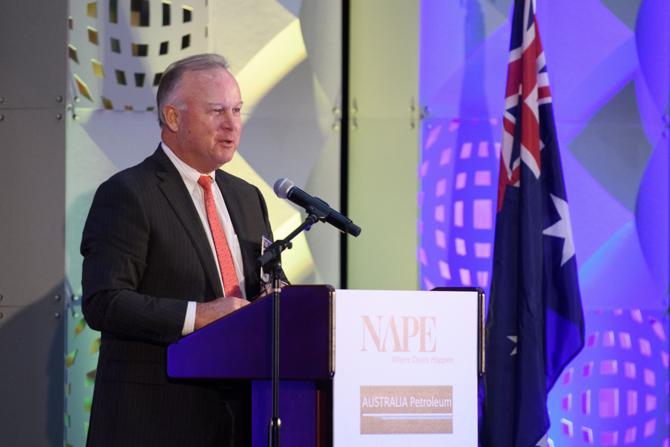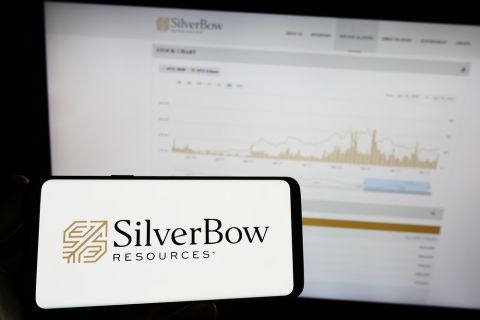
The shift in the E&P sector from a growth sector to a value sector was the most significant event from the past year, says Mike Grimm, immediate past chairman of RSP Permian and president of Rising Star Petroleum. (Source: Hart Energy/Shutterstock.com)
[Editor's note: A version of this story appears in the March 2019 edition of Oil and Gas Investor. Subscribe to the magazine here.]
Why would Concho Resources Inc. pay $9.5 billion for RSP Permian Inc. last year? “Because we had a thicker pile of crappy rocks than the next guy,” joked Mike Grimm, immediate past chairman of RSP Permian and president of Rising Star Petroleum. Turns out, these 95,000 acres of crappy rocks were at the epicenter of the world’s most-desired onshore oil play.
Grimm spoke to an audience at NAPE’s Global Business Summit in February, and said he gets asked often about what made his little Permian start-up eight years prior such a consolidation sweetheart.
As Grimm tripped through memory lane offering his observations on the biggest deals of the past year, he lingered on the second largest, noting, “I’m a little familiar with that one.”
With an early start in the movement to horizontal drilling in the Permian Basin, Grimm said the company focused on acreage in the deepest parts of both the Midland and Delaware basins, building blocky positions conducive for long laterals. The company subsequently went public and grew to be one of the leaders in the unconventional Permian.
But even though public, the urge to exit became imminent, he said. He recognized the company either had to grow through the drillbit or grow through a corporate acquisition, neither which seemed desirable at the time.
“We were always private guys—get in, build it, get out and go on to the next deal,” Grimm confessed. “We were eight years into a public company deal and, the fact of the matter is, hell, we were getting old and worn out. It was time to move on.” The problem? Considering RSP Permian’s sizeable valuation combined with a skittish public market, any deal would likely require either all or almost all stock to transact. So short of pocketing all cash, whose stock did they want to own?

during his keynote presentation in February. (Source: NAPE)
“It boiled it down to about five companies we were interested in whose currency we would like to own. And the larger that we grew, the smaller the universe of buyers.” Concho, of course, won the bid with its all-stock offer and the hearts of RSP’s shareholders.
But what happened next was both surprising and illustrative of a key theme playing out last year: Concho’s stock plunged by 11% in the days following the announcement. Similar phenomena occurred on announcements of Diamondback Energy Inc. acquiring Energen Corp., Encana Corp. buying Newfield Exploration Co., and Denbury Resources Inc. purchasing Penn Virginia Corp. [Editor's note: Denbury and Penn Virginia agreed to mutually terminate their merger March 21, 2019.]
“Investors were calling for consolidation, but they disliked most of the larger deals,” he said. Now, “all companies are nervous about doing a large transaction because they’re scared to death their stock is going to get creamed.”
Thankfully, and particularly for RSP Permian stakeholders, Concho shares recovered within 90 days and continued to grow to a 52-week high into the fourth quarter. Alas, a turbulent fourth quarter trimmed some 30% to 40% off of all oil and gas company valuations.
Grimm sees the shift in the E&P sector from a growth sector to a value sector as the most significant event from the past year, and takes it personally that the sector lagged. “E&Ps relative performance in the S&P in 2017 and 2018 were horrible,” he said. “We got creamed by entities like Netflix, Amazon, Facebook and Google. I mean, Netflix? C’mon!”
He referenced a private speech by an unnamed New York investment fund manager the night before, who said, “‘All shale companies are doomed unless they are working on net cash flow,’” the banker revealed. “‘And if they’re making a 10% return, 5% needs to go into company coffers, and the other 5% needs to go into dividends or share buybacks for the investors.’ So major change.”
As for acquisitions, “if the purchasing company of another company paid more than a 10% to 15% premium, they were going to penalize that company for paying too much. The Wall Street boys are pushing us for consolidation, but they’re also penalizing the hell out of us.
“Right now, it’s all about living within cash flow—regardless of size,” he said. “I hope the capital markets will come back with higher hydrocarbon prices, and not penalize us for stretching on good, common sense projects.”
That said, Grimm is bullish on supply and demand dynamics, laying out a long and detailed argument for why Saudi Arabian and Russian production is peaking, and why other non-OPEC conventional production will fall short of demand. But we’ll dig into that another day. For now, “I feel pretty good about what we’ve got going on here in the U.S.,” he said. “We’ve got the cheapest oil in the world.”
And his opinion of foreign entities that would try to put shale producers out of business? “When we pull together, [they] underestimate American ingenuity. They can’t outsmart us, they can’t outwork us, nor will they whip us.
“The majority of global growth lies here in U.S. hands.”
Steve Toon can be reached at stoon@hartenergy.com.
Recommended Reading
After Megamerger, Canadian Pacific Kansas City Rail Ends 2023 on High
2024-02-02 - After the historic merger of two railways in April, revenues reached CA$3.8B for fourth-quarter 2023.
Kimmeridge Fast Forwards on SilverBow with Takeover Bid
2024-03-13 - Investment firm Kimmeridge Energy Management, which first asked for additional SilverBow Resources board seats, has followed up with a buyout offer. A deal would make a nearly 1 Bcfe/d Eagle Ford pureplay.
TPG Adds Lebovitz as Head of Infrastructure for Climate Investing Platform
2024-02-07 - TPG Rise Climate was launched in 2021 to make investments across asset classes in climate solutions globally.
Air Products Sees $15B Hydrogen, Energy Transition Project Backlog
2024-02-07 - Pennsylvania-headquartered Air Products has eight hydrogen projects underway and is targeting an IRR of more than 10%.
NGL Growth Leads Enterprise Product Partners to Strong Fourth Quarter
2024-02-02 - Enterprise Product Partners executives are still waiting to receive final federal approval to go ahead with the company’s Sea Port Terminal Project.





